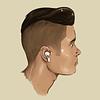You need to sign in or sign up before continuing.
Take a photo of a barcode or cover
3 / 5
Whitman’s writing and poetry is not really my style, so i enjoyed some parts of this while disliking other parts. still, I liked reading his work, even if just to broaden my horizons — and for school.
Whitman’s writing and poetry is not really my style, so i enjoyed some parts of this while disliking other parts. still, I liked reading his work, even if just to broaden my horizons — and for school.
emotional
hopeful
inspiring
reflective
slow-paced
Plot or Character Driven:
N/A
Strong character development:
N/A
Loveable characters:
N/A
Diverse cast of characters:
N/A
Flaws of characters a main focus:
N/A
Graphic: Sexual content
inspiring
reflective
This was worth reading through once, if for no other reason than to get a sense of Whitman's style, as he's had such a huge influence. I definitely liked some poems a lot more than others though, and can't really picture rereading this.
Beautiful and transcendent. I feel like I just don't "get" poetry, but that's my fault, not Whitman's.
"And your very flesh shall be a great poem."
"I am large...I contain multitudes" of ways to say the same thing over and over again
Whitman’s work was controversial when it came out, sometimes described as obscene. He used a strong first-person narration style and focused his attention on the ‘common people’ and lands of American, re-contextualising the concept of a poetic “epic” to do so. Over time, he kept adding to his work, ‘Leaves of Grass’, adding new poems.
I specifically read the Penguin print of the first 1855 edition, which contains only the poems from the original publication in their original form. This version is shorter than later editions. The poems in this collection (which received their titles in later editions) included:
- "Song of Myself"
- "A Song for Occupations"
- "To Think of Time"
- "The Sleepers"
- "I Sing the Body Electric"
- "Faces"
- "Song of the Answerer"
- "Europe: The 72d and 73d Years of These States"
- "A Boston Ballad"
- "There Was a Child Went Forth"
- "Who Learns My Lesson Complete?" and
- "Great Are the Myths"
"Song of Myself" is longer than all the other poems combined and forms the core of the work. The book's introduction describes it as a "prophetic" work that incorporates ideas of metapsychosis and philosophy. These concepts, upon reading, share more commonalities with Indian and other Eastern philosophies than contemporary Western thought. While there's no evidence that Whitman ever read texts like the Bhagavad Gita—these similarities appear to be either coincidental reinventions or ideas he absorbed indirectly from the Transcendental movements of his time.
Nevertheless, his work, particularly "Song of Myself" with its various sequences, presents a vision of divinity and rapture manifested in every living organism—"august and immortal" and present in "the grass that grows wherever the land is and the water is".
“If I worship any particular thing it shall be some of the spread of my body”
…
“I believe a leaf of grass is no less than the journeywork of the stars,
And the pismire is equally perfect, and a grain of sand, and the egg of the wren,
And the tree-toad is a chef-d’œuvre for the highest,
And the running blackberry would adorn the parlors of heaven,
And the narrowest hinge in my hand puts to scorn all machinery,”
Soooo… did I like this? Yes, in general. I don’t think Whitman will ever rank at the top of my ‘favourite poets’ list, and I don’t think he was wholly successful with what he was attempting in this book. But I did enjoy it, and I can see its influence on American poetry writ large.
“If otherwise, all these things came but to ashes of dung;
If maggots and rats ended us, then suspicion and treachery and death.
Do you suspect death? If I were to suspect death I should die now,
Do you think I could walk pleasantly and well-suited toward annihilation?”
- “To Think of Time”
adventurous
challenging
emotional
hopeful
inspiring
mysterious
reflective
relaxing
sad
slow-paced
Plot or Character Driven:
N/A
Strong character development:
N/A
Loveable characters:
N/A
Diverse cast of characters:
N/A
Flaws of characters a main focus:
N/A





